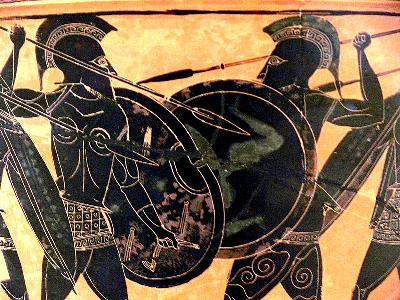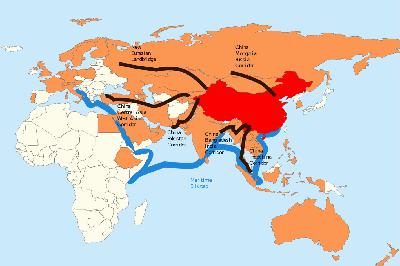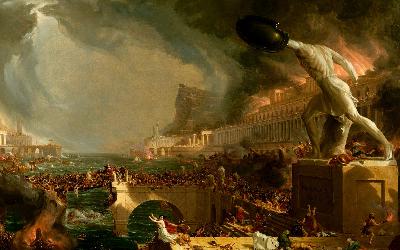The "Melian Dialogue" — A Brutal 2,500-Year-Old Lesson in Realpolitik
Description
The story of the famous Melian Dialogue was originally written over 2,500 years ago by ancient Greek historian Thucydides. I have included both the text and audio version in this Substack (and removed the paywall) for easier sharing because of how important the lessons from this ancient historic text are even today.
What follows is meant to serve as both a stand-alone episode and as a supplemental to my recent essay/podcast called: "The Strong Do What They Can and the Weak Suffer What They Must — A Deep Dive into the End of Post-WWII Moral Internationalism and a Revival of the 2,500-Year-Old Melian Dialogue.”
For a little bit of context before we dive in, the Melian Dialogue was one short chapter in Thucydides’ multi-volume historical account of the History of the Peloponnesian War, in which he meticulously documented the entire 27-year-long war between Athens and Sparta. He himself served as an Athenian general during that war.
The chapter on the Melian Dialogue describes the dramatized negotiations between Athens and the rulers of the small island city-state of Melos, in the Aegean Sea, on the eve of Athens fateful siege of the city as Melos tried in vain to negotiate for its independence, offering its loyal friendship to Athens as an alternative to being conquered.
Even today, the Melian Dialogue is still taught in universities and military colleges all around the world as a case study in political realism and because of the profound and complex philosophical questions that are captured by this short story. As our current world transitions from the heady idealism of the now-defunct post-WWII era into a harsher multi-polar world where national interests once again trump all other considerations, the Melian Dialogue is required reading to understand what is to come.
Some truths are as valid today as they were 2,500 years ago. I promise the short story of the Melian Dialogue is well worth your time.
I have combined the text of several earlier translations and updated them into modernized English to create an easy-to-read standalone story. My version draws from three translations: Benjamin Jowett’s 1881 translation (available on the Internet Archive), Richard Crawley’s 1914 translation (available for free on Project Gutenberg), and Rex Warner’s 1916 translation (available on both the Internet Archive and on Amazon (Amazon affiliate link)). Links to all three are provided in the text version of this essay. If you want to take a deeper dive into Thucydides works, I recommend reading the Rex Warner edition as the easiest to read of the three versions.
The Melian Dialogue
by Thucydides, from his History of the Peloponnesian War (Book 5, Chapter 17)
Sixteenth Year of the War—The Melian Conference—and the Fate of Melos
In the summer of 416 BC, the Athenians also launched an expedition against the island of Melos. The Melians are a colony from Sparta. They had refused to join the Athenian empire like the other islanders, and at first had remained neutral without helping either side; but afterwards, when the Athenians had brought force to bear on them by laying waste to their land, they had become open enemies of Athens.
Now the Athenian generals encamped in Melian territory and, before doing any harm to the land, first of all sent representatives to negotiate. The Melians refused to give them a public hearing, but instead asked them to state the object of their mission in a closed-door session open only to the island’s magistrates and governing council, to which the Athenian envoys replied:
ATHENIANS: Since we are not allowed to speak directly to the people, no doubt in case the mass of the people should hear once and for all and without interruption an argument from us which is both persuasive and incontrovertible, and should so be led astray — for we are perfectly aware that this is why you have only granted us a private audience — why don’t you select few who sit here take an even more cautious approach? Let us have no set speeches at all, but let us proceed one statement at a time, to which you may reply at once with your disapproval and criticisms to settle that which you do not like, before proceeding further. Do you like this proposal?
To which the Council of the Melians responded:
MELIANS: The quiet interchange of explanations is a reasonable thing, and we do not object to that. But your military preparations are too far advanced to agree with what you say, as we see you have come to be judges in your own cause, and that at the end of the negotiation, if the justice of our cause wins the argument and we therefore refuse to yield, we may expect war; and if we are convinced by your arguments, slavery.
To which the Athenians replied:
ATHENIANS: If you have met with us to speculate about the future, or for any other purpose other than to look the facts in the face and on the basis of these facts to consider how you can save your city from destruction, then we can end this conversation now; otherwise, we are ready to proceed with our negotiation.
The Melians responded:
MELIANS: It is natural and understandable for people in our position to explore all kinds of arguments and different points of view. But we admit that this conference has met to consider the question of the preservation and security of our country; and therefore let the argument proceed in the manner which you propose.
And so, the Athenians began:
ATHENIANS: Well then, we shall not trouble you with specious pretences—either of how we have a right to our empire because we overthrew the Persians, or are now attacking you because of some wrong that you have inflicted on us—we will not make long speeches like that, which you would not believe; and in return we hope that you, instead of thinking to influence us by saying that, although you are a colony of Sparta, you have not taken part in their military expeditions or that you have never done us any harm. Instead we recommend that you should try to get what it is possible for you to get, taking into consideration what we both really think; since you know as well as we do that, when these matters are discussed by practical people, that the question of justice arises only between parties equal in strength. Outside of that, the strong do what they have the power to do and the weak must accept what they have to accept.
To which the Melians replied:
MELIANS: Then in our view (since you force us to leave matters of justice aside and to confine ourselves only to self-interest) – it is at any rate useful that you should not destroy a principle that is to the general good of all men – namely, that in the case of all who fall into danger there should be such a thing as fair play and just dealing, and that such people should even be allowed to use and to profit from arguments that are not strictly valid if they can get away with it. And this is a principle which is as much in your interest as in ours, since your own defeat would also be followed by the most terrible punishments to set an example for the rest of the world.
The Athenians shot back:
ATHENIANS. The end of our empire, if end it should, does not frighten us: we are not so much frightened of being conquered by a power which rules over others, as Sparta does (not that we are concerned with Sparta for now), as of what would happen if our own subjects may some day rise up and overthrow their former masters. This, however, is a risk that we are content to take. We will now proceed to show you that we have come here in the interest of our empire, and that we shall say what we are now going to say for the preservation of your country; we do not want any trouble in bringing you into our empire, and we want you to be spared for the good both of yourselves and of ourselves.
MELIANS: And how could it turn out as good for us to serve you, as for you to rule us?
ATHENIANS: Because you would have the advantage of submitting before suffering the worst, and we would gain by not destroying you.
MELIANS: So you would not agree to our being neutral friends instead of enemies, but allies of neither side?
ATHENIANS: No, because it is not so much your hostility that can hurt us; it is rather the case that, if we were on friendly terms with you, our subjects would regard that as a sign of our weakness, whereas your hatred is evidence of our power.
MELIANS: Is that your idea of fair play? – that no distinction should be made between people who are quite unconnected with you and people who are mostly your own colonists or else rebels that you have conquered?
ATHENIANS: As far as right and wrong are concerned, subjects think that there is no difference between the two, that those who still preserve their independence do so because they are strong, and that if we fail to attack them it is because we are afraid. By conquering you we shall not only increase the size but the security of our empire. We rule the sea and you are islanders, and weaker islanders than the others; it is therefore particularly important that you should not escape.
MELIANS: But do you think there is no security for you in what we proposed? For here again, since you will not let us mention justice, but tell us to give in to your interests, we, too, must tell you what
























